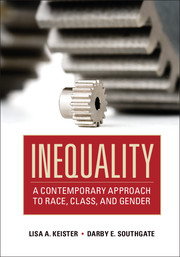Book contents
- Frontmatter
- Contents
- Acknowledgments
- I Basic Concepts
- II Applications
- 5 The Upper Class and the Elite
- 6 The Middle Class and Workers
- 7 The Working Poor and the Underclass
- 8 Social Mobility
- 9 Education and Inequality
- 10 Women and Their Changing Positions
- 11 Race and Ethnicity
- 12 Culture
- 13 Inequality across the Globe
- 14 Public Policy and Social Stratification
- Index
- References
13 - Inequality across the Globe
from II - Applications
Published online by Cambridge University Press: 05 June 2012
- Frontmatter
- Contents
- Acknowledgments
- I Basic Concepts
- II Applications
- 5 The Upper Class and the Elite
- 6 The Middle Class and Workers
- 7 The Working Poor and the Underclass
- 8 Social Mobility
- 9 Education and Inequality
- 10 Women and Their Changing Positions
- 11 Race and Ethnicity
- 12 Culture
- 13 Inequality across the Globe
- 14 Public Policy and Social Stratification
- Index
- References
Summary
So far, our discussion has been almost exclusively about inequality in the United States. Although inequality and stratification in the United States are clearly complex enough to warrant the space given them, it is important to remember that patterns of stratification and the processes leading to them are different in other countries. It also is informative to consider where the United States falls in the larger picture. There are no contemporary societies in which resources are equally distributed, but the degree of inequality varies dramatically among countries. In particular, the disparity between the very rich and the very poor often differs notably across countries. This is especially true when comparing developed countries (e.g., Australia, the United States, Canada, and the United Kingdom) with those that are still developing (e.g., Brazil, China, Hungary, India, and Mexico). Understanding how the United States compares to other countries puts in perspective the processes we encounter close to home.
This chapter explores how the United States compares to other countries in terms of inequality and stratification. We consider various dimensions of inequality starting with a comparison of the United States to other developed countries. We explore cross-national patterns of income, poverty, work, mobility, and other indicators of well-being, such as the nature of the welfare state and the ownership of housing and other forms of wealth. We then compare developed countries to countries that are still developing. We explore multiple dimensions of inequality to provide as complete a picture as possible. We conclude with a discussion of inequality in transition economies – those that have undergone a transformation in recent decades from socialism to more market-oriented economic systems. As we consider inequality in comparative perspective, a special caveat is in order: The data used to compare countries can vary in subtle but important ways. As we discuss how the United States compares, remember that minor differences in data collection and analysis can have significant implications for interpretation. As with all data, read with a critical eye and an understanding that no empirical evidence is perfect.
- Type
- Chapter
- Information
- InequalityA Contemporary Approach to Race, Class, and Gender, pp. 504 - 545Publisher: Cambridge University PressPrint publication year: 2012



